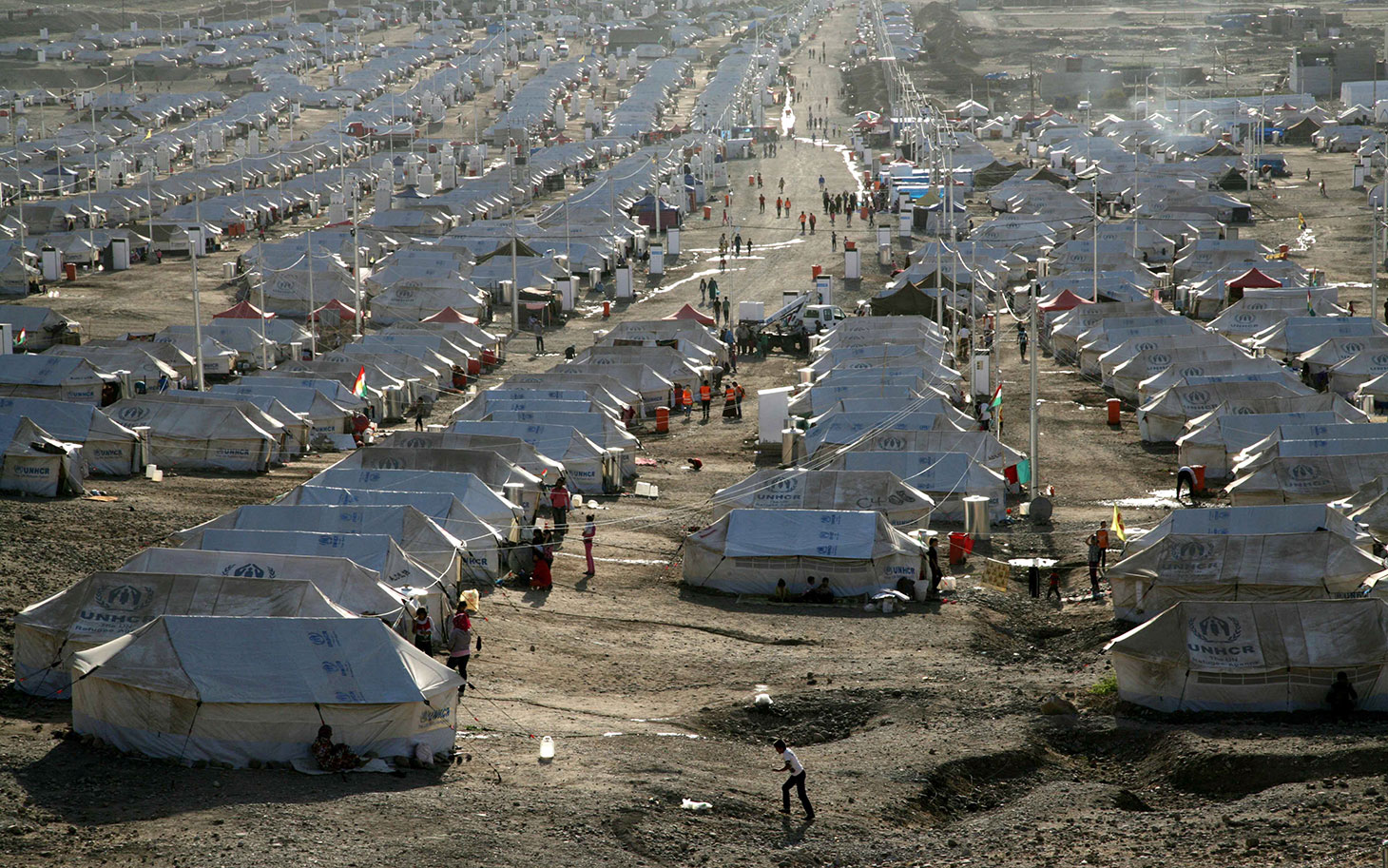Why Being an Intelligent, Politically Informed Adult Sucks
No matter what your position on the matter is, the only indisputable claim is that the issue is complicated.
By Alison Miller, University of Texas at Austin
The internet can be a mighty depressing place—more so now than ever because it’s flooded with heart-wrenching photos of Syrian refugees fleeing their civil-war-torn country.
As shocking as the pictures are, what’s even more shocking is that it’s taken this long for the Syrian refugee crisis to attract this much attention—even now, the majority of the attention focused on Syrian affairs is coming in the aftermath of the terrorist attacks in Paris on November 13.
A lot of Americans didn’t even know there was a civil war in Syria until 2013, when the Syrian government was accused of committing acts of chemical warfare against its people in the form of a massive attack on civilians involving the neurotoxin sarin.
To write a comprehensive history of the Syrian civil war and the factors that birthed it would take volumes—not to mention, more patience than your dear writer has.
Short version: the Syrian civil war began in 2011, when protests against the country’s President, Bashar al-Assad, escalated into a full-blown rebellion. Always a sucker for the underdog, the US has since joined the fray in support of the rebel cause, joined by several other international players—most notably, France, the UK, Saudi Arabia and Turkey.
The reigning Syrian government, on the other hand, has received support from Iran and Russia. Efforts at peacemaking and facilitating diplomatic solutions have largely failed.
Complex as it already was, the situation got even worse when ISIS entered the equation. At this point, at least 11 million refugees have been displaced—at least half of the pre-civil war population.
The Syrian infrastructure has largely collapsed, leaving many of those who remain in the country without access to medical treatment or other public services.
While many European countries (among them, Greece, France and Turkey) have accepted Syrian refugees across their borders and provided what aid they can, others (including Muslim countries like Saudi Arabia, Kuwait and Qatar) have refused to admit the refugees access at all.
The good news is that the Syrian crisis is starting to attract more attention, thanks largely in part to a few well-known public figures who made their own pilgrimages to the Middle East – among them, writer Neil Gaiman, who journeyed to Jordan in 2014, and the soaringly popular author of the blog Humans of New York, who dedicated months of work to various Middle Eastern countries, Syria among them.
The bad news is that the US is, once again, a country divided in regards to how to deal with the refugees’ plight, a persecution and exodus that has been called the worst humanitarian crisis of the 21st century.
For those fleeing Syria, the ISIS-driven attacks in Paris earlier this month spelled bad news, especially when reports began to circulate that one of the attackers in Paris had slipped in among the tides of other refugees. Americans were quick to remember that the Tsarnaev brothers, who were responsible for the Boston Marathon bombing in 2013, were also refugees.
(Or were they? Two years later, sources still differ as to whether the brothers’ family arrived in America with the intention of seeking asylum or whether they were granted visas after initially coming over as tourists.)
Moreover, though they were not found to be affiliated with any particular terrorist organization, the Tsarnaev brothers did hold extremist Muslim views that were responsible for motivating their actions at the Boston Marathon.
Back to 2015. As we watched the news on Friday, November 13 in silence, my French boss said soberly, “You know, this is France’s 9/11.”
In the week and a half since then, the US has been wracked by waves of Islamophobia comparable only to those which the country experienced after September 11, 2001.
More likely, the anti-Islamic sentiments that originated in 2001 never died away, but merely lay dormant until the tragedy in Paris ripped the Band-Aid off the barely-healed wound. News channels and social media platforms alike have exploded with questions like, Is Islam a fundamentally violent religion? Are we endangering our own citizens by allowing Muslim refugees into our country?
The subsequent backlash has been dizzying to behold. In the midst of the fear-fueled tornado of contention, a few persons in particular have stood out: most notably, Reza Aslan, a scholar who unleashed an impassioned and well-informed tirade against a news anchor who asked whether Islam didn’t inherently promote violence and FGM (female genital mutilation) in the countries where it’s practiced; and, of course, Donald Trump, who seized the opportunity to advocate for a database of Syrian refugees and monitoring of certain mosques.
At this point in time, the US has accepted about 1500 refugees, with plans to welcome many more within the next year. Whether those arrangements will be carried out is anyone’s guess at this point.
Over 31 states’ (Texas included, unsurprisingly) governors have publicly stated that they will not allow refugees to take up residence within their borders.
Technically, that decision isn’t the states’ decision to make, and the federal government will have final say in the matter. And while President Obama is probably tempted to write Greg Abbott and the rest of the Republican governors off as being full of hot air and prone to overstepping Constitutional privileges, it’s worth paying attention to who’s willing to aid the refugees and who’s not—if for no other reason that it’s probably not in the refugees’ best interest to be relocated to states where they are a) likely to be awarded minimal aid at best and b) at a higher risk for vigilante violence from scared citizens.
Meanwhile, let’s not forget the double standards that many a social media user has eagerly pointed out.
First, that the US itself was founded by refugees (aka, the Pilgrims) fleeing what they considered to be an oppressive regime (aka, the 17th-century English monarchy).
And second, that as we approach the holiday season, most Americans will be celebrating a religion whose patron saint/primary deity (aka, Jesus Christ) was born to two Middle Eastern refugees (aka, Mary and Joseph) in a barn. Not to mention that this same divinely conceived refugee baby was known to preach tolerance and charity on multiple occasions. Womp.
Some of the more creatively inclined have taken to illustrating these hypocrisies in the form of comics and humorous  sketches. This author highly recommends that you take a few minutes out of your day to look for them. A little bit of sugar helps the medicine go down, and all that.
sketches. This author highly recommends that you take a few minutes out of your day to look for them. A little bit of sugar helps the medicine go down, and all that.
Confession time: I put off writing this article for a long time because I had no idea what I was going to say. Truthfully, sometimes having all the facts and being well-educated on a particular issue doesn’t make it any easier to form an opinion. Thinking that maybe I had been reading too many articles and interacting too little with the real world, I asked a friend over a glass of wine what he thought the US should do about the refugee crisis.
“Would you be comfortable with Syrian refugees in the US?” I asked.
“I guess so,” he replied, “Provided that they underwent extensive screening before being admitted.”
“They do,” I said. “They have to be recommended by the UN High Commissioner for Refugees before they even begin being screened by the Department of Homeland Security.”
“What about the Tsarnaev brothers?” he shot back. “They were supposedly screened too.”
“Yeah,” I conceded. “But that was two years ago. I’m sure that they’ve stepped up their screening process since then.”
“Yeah. They probably have,” he said, looking at me over the book he was reading. “But would you stake your life on it?”
I honestly didn’t know.
















